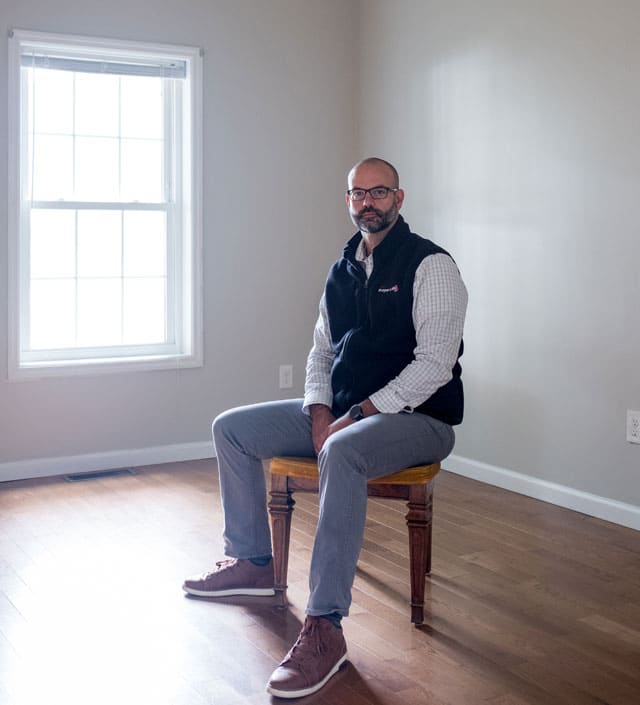When Detroit Mayor Mike Duggan talks about his accomplishments in the city, the list is both impressive and sad. He had the streetlights turned back on and reopened closed parks. In the decade since he took office, the city has demolished about 25,000 blighted homes whose rusty debris and incubation of crime drag down neighborhoods.
The progress would be even greater, the mayor argues, if the city hadn’t been smothered by speculation. In the years after the Great Recession, tens of thousands of Detroit properties were bought by absentee landlords and faceless LLCs. The owners are so negligent and hard to find that the city mows their lawns without asking.
Duggan gets angry discussing the subject. In speeches and community meetings, he paints a stark, moralized contrast between the businesses that invest in jobs and the sit-and-wait landowners whose paydays rely on others’ efforts.
“Blight is rewarded, building is punished,” he said in a recent speech, repeating it over and over for emphasis.
The refrain is a windup for Duggan’s scheme to fix the blight: a new tax plan that would raise rates on land and lower them on occupied structures. Slap the empty parcels with higher taxes, the argument goes, and their owners will be forced to develop them into something useful. In the meantime, homeowners who actually live in the city will be rewarded with lower bills.
“The phrase we use is ‘Land should eat,’” Duggan, 65, said in a recent interview at his office.
Seemingly without knowing it, Duggan, a Democrat in his third term, was espousing what generations of policy minds consider one of the best ideas nobody will listen to: the land-value tax.
The notion that land is an undertaxed resource — and that this distorts markets in destructive ways — unites libertarians and socialists, has brought business owners together with labor groups and is lauded by economists as a “perfect tax.” And yet despite all that agreement, there are just a handful of examples of this policy in action, and none in America that match the Detroit proposal in scale.
This is at least in part because the land-value tax has historically been associated with Georgism, an ideology whose adherents are regarded as the tinfoil-hat-wearers of economics. Strict Georgists don’t just believe land-value taxes are a good idea; they believe that if America were to throw out all taxes, then replace them with a single land-value tax, it would end poverty and recessions for good.
The fundamentalist version of Georgism, like the fundamentalist version of anything, is plainly unrealistic. But the broader Georgist framework is full of insights about urban economies and how to improve them.
Over the past year, Daryl Fairweather, chief economist at the real estate brokerage Redfin and one of the most widely quoted voices on the housing market, has become one of the land-value tax’s most outspoken advocates. She trumpets the policy on podcasts, headlines panels with names such as “the tax policy that can fix housing” and tweets memes of President Joe Biden in front of a whiteboard with the words “land-value tax” on it.
In an interview, Fairweather said she did not consider herself a Georgist, single tax and all that, but said land-value taxes were so smart that one of her favorite parts of arguing for them was they allowed her to “always be right.” They encourage housing development instead of discouraging it, she noted. They don’t discourage work or investment, like taxes on income and capital gains. They’re also hard to dodge, since land is hard to move.
“It’s like there’s this tool in our toolbox that could help solve a lot of our problems, and we refuse to pick it up,” Fairweather said. “If more people understood how useful this was, they would advocate it.”
Strong feelings about land taxes are something the American public used to have. Georgism gets its name from Henry George, who in the 1890s turned a book, “Progress and Poverty” (1879), into a populist movement. George’s argument was that since land derives most of its worth from its location and the surrounding community, that community, and not the owner, should realize most of the benefits when values rise. His fix might sound wonky — tax the value of land but not improvements atop it — but it made him a celebrity in the 1890s.
There used to be Georgist newspapers. There are still Georgist foundations, Georgist conferences and Georgist schools. If you’ve ever played Monopoly, you have been unwittingly George-pilled: A Henry George fan invented the board game, in hopes of spreading his teachings.
Over the past few decades, as Georgism has faded from a mass movement to a relic, the ideology has been carried on by clubs and nonprofits whose dwindling membership was composed mostly of old men.
But amid a continuing crisis in affordable housing, a generation of young professionals has burrowed into housing policy and gotten interested in the YIMBY movement — for Yes in My Backyard — that advocates for denser neighborhoods and zoning changes. As YIMBYs have grown from a curiosity to a legislative force, a subset of them and others who are angry about the cost of living have discovered Georgism. Suddenly, there are organizations such as Young Georgists of America, modern-day pamphlets such as the Henry George podcast and the Progress and Poverty Substack, and an agreement that the shoshinsha emoji (which looks like a shield) is how Georgists will identify themselves online.
Young and old, Georgists come across as both radical and refreshingly pragmatic. They are interested in a specific problem: the cost of land and housing. But they embed that within a worldview that seeks to balance morality with commercial growth and rejects off-the-shelf -isms (capitalism, socialism, libertarianism) as unsatisfying or incomplete. Most are progressive liberals, while some lean libertarian. Their desire for an alternative makes them sound rational in some cases (land-value taxation is a good idea) and bizarre in others (we should get rid of every other tax).
Duggan knew none of this. When I asked him if he had heard of Henry George at the beginning of our interview, his answer was “Nope.” He was surprised to learn that he had become something of a Georgist hero and that his plan was being cheered as a step toward restoring Georgism to the American conscience.
“This isn’t any deep philosophical movement,” Duggan said. “I’m trying to cut taxes.”
‘You Are Welcome Hither’
Driving along woodsy back roads in a Model A Ford, Mike Curtis, an 81-year-old retired arborist, seemed to be winding through a portal to the Georgist past. A third-generation member of the movement, Curtis used to work at the Henry George School in Philadelphia and lives in the Village of Arden, in Delaware, a sort of Henry George colony founded in 1900. (The motto is “You Are Welcome Hither.”)
The drive was the final leg in a morning-to-afternoon tour that included a stop by the Henry George Memorial Green and a walk through the outdoor theater where village founders staged Shakespeare plays. (“They figured if you could be comfortable onstage and project your voice to a crowd, what better way to prep yourself to talk about Henry George?” a guide informed me.) We ended at Curtis’ house, where the decor has a theme: There are single-tax posters, a Henry George light switch, Henry George quotes, Henry George mugs, and a shelf of home videos with titles such as “Law of Rent,” “3 Land Value Tax Movies” and “Taxes-Taxes-Taxes.”
Born in 1839 in Philadelphia, George — a self-made man without a formal degree in economics — started his swashbuckling career when he left home as a teenager to work on a ship headed to India. He acquired a pet monkey at port and returned home with scenes of poverty seared into his brain. (“One feature, which is peculiar to Calcutta, was the number of dead bodies floating down in all stages of decomposition,” he wrote in a journal.) What he saw in India helped inspire his theories on growth, but it wasn’t until George sailed to California — where, after a brief run of gold prospecting, he settled in San Francisco and became a journalist — that these ideas found their full expression.
The central question of George’s writing was why rich cities seemed to create poverty instead of ameliorating it. In “Progress and Poverty,” George blamed rising land values and laid out the single-tax proposal as a cure-all.
George did not invent land-value taxation, but he unquestionably was the idea’s greatest popularizer. With a mix of wit and fury, and a whole bunch of exclamation points, his writing portrayed speculators as societal leeches grifting the city, profiting by doing nothing: “You may sit down and smoke your pipe,” he wrote in “Progress and Poverty.” “You may go up in a balloon, or down a hole in the ground; and without doing one stroke of work, without adding one iota to the wealth of the community, in 10 years you will be rich!”
By the end of the 19th century, George’s books had sold an estimated 5 million copies. George returned East and used the single-tax platform to run for New York City mayor, twice. He placed second in his first campaign in 1886, then ran again in 1897 but died four days before the election.
The great trick of Georgism is that it manages to sound capitalist (just one tax!) and socialist (speculation is bad!) all at once. “Progress and Poverty” found a natural audience in an emergent class of artisans, which included printers, journalists and lawyers, who were the 19th century’s version of knowledge workers, said Christopher England, a lecturer at Towson University in Maryland and the author of “Land & Liberty,” a new book on the Georgist movement. But the movement also had wealthy adherents, including Joseph Fels, a millionaire soap manufacturer who had an obvious interest in lower taxes and was a generous funder of Georgist causes, including the Village of Arden.
Curtis’ family members, while not among Arden’s founders, were fixtures of the movement: His grandfather worked on George’s 1897 mayoral campaign and was there when George died. He met Curtis’ grandmother at a Georgist event, and they married on George’s birthday.
“So when you say ‘cult,’ it was kind of like that,” Curtis said.
Today, Arden is one of three neighboring villages (Arden, Ardentown, Ardencroft) that try to live by George’s teachings, through a structure in which each town’s land is held in a trust, and lots are leased to residents. They pay a tax on the value of their plot, but nothing on improvements.
Georgism started to fade in the 1920s as the automobile pushed down land values by stretching the limits of urban development. In the next decades, homeownership exploded into the apex symbol of a thriving middle class. The phrase “land-value tax” has come to sound suspiciously like “higher property tax,” making the politics even more difficult.
Curtis has spent the better part of his life proselytizing about land taxes but lamented that even in his hometown, Arden, most people are somewhere between ignorant of and indifferent to Henry George. Most of his work now occurs in a home office with five printers. That’s where he runs the Henry George Academy’s incarcerated student program. Curtis mails lessons based on “Progress and Poverty” to inmates in state and federal prisons, grades the papers they send back and then mails a certificate upon completion.
“When I’m gone, at least somebody will have known the thesis of Henry George,” he said. “I wasn’t just talking to myself.”
Hope of a Real-World Victory
When modern Georgists describe their descent into the wormhole, the journey sounds like a healthier, nerdier version of the route to QAnon. “I think one day I just typed ‘Why do the suburbs suck?’ into Google,” said Nia Johnson, a 29-year-old consultant focused on startups and consumer technology.
The Googling led to a TED Talk on suburban design, she said, which led to urbanism Twitter, and to following various YIMBY accounts. She started tweeting about zoning policy, and then one day, a social media follower said she sounded like a Georgist, which led to another Google search.
“And I was like, ‘Oh, my God, yes,’” Johnson said. “Once you learn about it and understand it, you see how almost everything about our economy and our society that is crappy can be attributed in some way to poor land use.”
Johnson, like many of the new Georgists, fits a certain archetype: She’s young and loves cities, but she wishes they were less expensive to live in.
For her, Georgism isn’t a full platform — Johnson, like Fairweather of Redfin and most of their cohort, doesn’t believe in a single tax, for instance. Instead, it represents her aspiration for something different: better housing policy and the idea that social welfare and market capitalism don’t have to be in opposition.
Like a lot of the new Georgists I spoke with, Johnson discovered Georgist ideas during the pandemic, which seems to have been an ideal vector for the ideology’s spread: There was an audience of professionals with high rent, stuck inside, watching home prices soar, with the time to go deep on a 19th-century thinker. In 2020, Astral Codex Ten, the futurism blog widely read in Silicon Valley circles, published a series of guest blog posts on Georgism that were so popular that they were compiled into a book, “Land Is a Big Deal.”
From Delaware to California, every Georgist I talked with was closely following Detroit. Duggan’s proposal, while a long way from full-blown Georgism, represents something the movement hasn’t had much of: the hope of a real-world victory and a chance to show how land-value taxes can solve an actual problem — in this case, blight.
Detroit, for all its problems, is more hopeful today than it has been in decades.
Will it ever again be the Detroit of the 1950s? Probably not. But to someone walking around downtown, past new cranes, new restaurants and a new Gucci store, it’s clear that the nadir of the Great Recession is comfortably in the past.
The problem is that in the years after the downturn, investors bought large swaths of the city and have mostly just sat on it.
From 2011-15, about 100,000 properties — more than one-fourth of the Detroit lots — were auctioned in tax foreclosures, according to Regrid, a Detroit-based provider of parcel data nationally. They weigh on the city’s progress and produce a stream of sad stories, such as the one about a grandmother who was evicted from her home and moved to a van across the street but continued to mow the lawn because she cared about the neighborhood.
Duggan refers to vacant properties as “lottery tickets.” They can be bought for little and held for little — some lots have taxes as low as $30 per year — but have a huge potential payoff, usually because someone else wants to invest. (Speculators recently made money after the city bought out vacant lots to help revive an auto plant that would bring jobs to the area.)
Problems such as this are what helped spur interest in a new tax scheme. An early advocate for Detroit’s plan was Nick Allen, now a 32-year-old graduate student in urban planning at the Massachusetts Institute of Technology, who worked for a city economic development agency from 2017-19. Allen said his main project at the agency was finding new ways to stimulate growth that didn’t rely on grants and tax breaks. After reading “Progress and Poverty” years earlier, he had become obsessed with the problem of speculation, and suggested a land-value tax. (Allen said he had never mentioned Henry George to the mayor because “the idea survives on its own without having to go back to 1879.”)
Instead of citing a dusty text, Duggan’s speeches on the land-value tax feature the politically salient image of homeowners with lovely gardens who pay more in property taxes than the vacant apartment building next door. A tax break for residents — paid for by nameless investors who are “taking advantage of the city” — would seem like a political layup.
But he needs state approval to do it, and lawmakers have been skeptical. This year, Michigan legislators debated a bill that would allow the mayor’s plan to go forward, but the measure was tabled until next year. Even if the bill passes, Detroit voters would then have to approve it. It’s a lot of ifs.
However it goes, the question for Georgists is whether Detroit is a particular city with a particular problem or the opening salvo in a larger conversation.
Most of the new Georgists I spoke with were concentrated in and around high-cost cities whose housing problems stem from a lack of supply — that is, basically, the opposite of Detroit.
When Duggan says “land tax,” he means encouraging growth on empty parcels and a tax cut for homeowners. When Mark Mollineaux, a 38-year-old engineer in Silicon Valley, says “land tax,” he is pointing to $3 million bungalows in Palo Alto, California, and his wish that they could be replaced with denser housing or at least had higher taxes. In other words, in a depressed city, homeowners are victims; in rich ones, they’re the enemy.
“These homeowners have a land value of millions, and they’re hoarding it,” Mollineaux, who hosts “The Henry George Program,” a radio show and podcast, said in an interview.
“I advocate razing Silicon Valley, socializing the land and building massive condos that are owned by the public and allocated equitably,” he added. “But even a tweak would be nice.”
c.2023 The New York Times Company. This article originally appeared in The New York Times.







